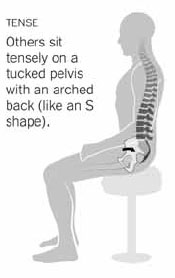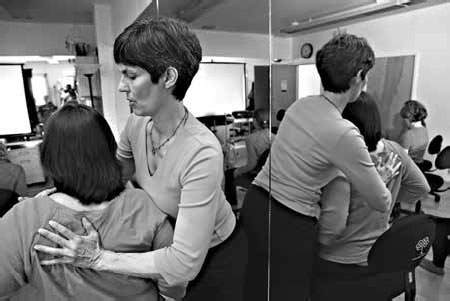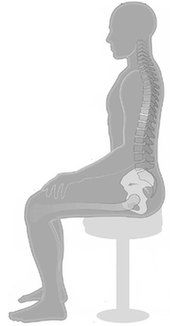Guru of posture takes on the workday slouch
Updated: 2013-06-02 08:01
By Amy Schoenfeld(Th New York Times)
|
|||||||
|
Esther Gokhale says her advice about posture can relieve nagging back pain. Jim Wilson / The New York Times |
|
Gokhale Method: Clients sit upright and relaxed with a forward-tilting pelvis and a well-stacked spine. The New York Times |
Office workers around the world are chained to their technology, hunched over desktops, laptops, smartphones and tablets, and it's all taken a toll on their bodies.
Esther Gokhale, 52, a posture guru in Silicon Valley, believes that people suffer from pain and dysfunction because they have forgotten how to use their bodies. It's not the act of sitting for long periods that causes us pain, she says, it's the way we position ourselves.
Ms. Gokhale is not helping aching office workers with high-tech gadgets and medical therapies. Rather, she says she is reintroducing her clients to what she calls "primal posture" - a way of holding themselves that is shared by older babies and toddlers, and that she says was common among our ancestors before slouching became a way of life. It is also a posture that Ms. Gokhale observed during research she conducted in a dozen other countries, as well as in India, where she was raised.
Her method has been embraced by executives, board members and staff members at some of Silicon Valley's biggest companies, including Google and Oracle; and heavy users of technology.
"I need to do things that make sense and that I can see results from. Esther's work is like that," said Susan Wojcicki, 44, one of Google's senior vice presidents, who has suffered from back and neck pain that she attributes to doing too much work at her desk.
Ms. Gokhale is not the first to suggest that changing posture is the key to a healthy spine. Practitioners of the Alexander Technique and the creators of the Aplomb Institute in Paris similarly help clients find more natural and comfortable ways to position themselves. Pilates and physical therapy can improve posture and bring awareness to it. A handful of companies, like Lumo BodyTech, sell posture monitors, offering smartphone users feedback about the way they hold their bodies.

Backaches affect most Americans - about 8 in 10 deal with the pain at some point in their lifetimes, said Dr. Richard Deyo, a professor at Oregon Health and Science University.
The expenses are huge as well. By one estimate that appeared in The Journal of the American Medical Association, the national cost of treating people with back and neck pain was $86 billion in 2005 in the United States. And with back pain one of the top reasons for worker disability, missed work because of these aches may cost employers close to $7 billion a year, according to one study.
For most people with back pain, the aches are short-lived, Dr. Deyo said. But methods to help those with chronic pain are diverse. Using a standing desk at work has become a popular way to ease discomfort. Exercise, yoga, acupuncture and chiropractic have also been shown to reduce pain. Medical treatments continue to be important options, doctors say, even amid concerns that these have been overused.
Ms. Gokhale had to deal with her own pain in her lower back, first as a college student practicing yoga, then as a young mother with sciatica. She eventually had surgery for a herniated disk, but it failed, she said. When doctors suggested she try a second time, Ms. Gokhale began a search for other answers.

In Ms. Gokhale's courses, students relearn how to sit, stand, sleep and walk. She says most people tend to be relaxed and slumped (think of a C-shaped spine), or arched up and tense (an S shape), the stand-up-straight style of posture that some parents demand of their children. She helps her students return their bodies to the stance that she says nature intended: upright and relaxed (a tall J spine).
With care, Ms. Gokhale adjusts clients' bodies from bottom to top. She helps clients relax the front of the pelvis downward, so the belt line slants forward and the butt angles back, so "your behind is behind you, not under you."
Ms. Gokhale guides students' rib cages that sway too far back, so they are flush with the stomach. She takes their hunched shoulders, rolls them up and brings them gently back and down. And she helps students release tension in their necks by recentering their heads over their spines and pulling upward slightly. The result is an elongated and well-stacked spine that many students say they can maintain.
Ray Bingham, 67, the presiding director of Oracle's board, was referred to Ms. Gokhale last fall for his lower back pain. Mr. Bingham says he has found relief after using her methods and he diligently practices his newfound ways of sitting, walking and standing.
"This is not an approach like physical therapy with a beginning and an end; this is a new way of being from now on," Mr. Bingham said.
The New York Times
(China Daily 06/02/2013 page10)

